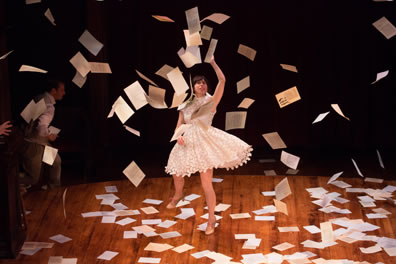A Conversation with the Founders of Fiasco Theater
[Return to previous page]
Now, of course, Two Gents famously has a dog. So, is it going to be a seventh member of the cast or somebody playing Crab?
BEN: I'll just tell you that we don't know, we don't know yet.
NOAH: Somebody brought this up and I still think it's a good idea that it just gets played by an actual crab.
JESSIE: I feel like the D.C.-area audience would appreciate that: crabmeat, Maryland.
That's true.
BEN: I'm going to sign off now. It was great talking with you.
Good talking with you, Ben. Thank you very, very much for your time. I appreciate it.
BEN: All right, I look forward to seeing you in Washington. Bye-Bye.
Are there other plays you guys are thinking about that really are appealing to you right now?
NOAH: There certainly are other Shakespeare plays that are appealing to us. We're asking ourselves what other authors, what other kinds of theater. I don't know if we should be floating titles—I'm looking at Jessie right now.
JESSIE: I don't know. Eventually we'd like to do all the Shakespeare plays, I think.
That would be cool.
JESSIE: But for now, I think continuing to use the criteria of ensemble pieces that work with a single generation. We are a single-generation company. But we're starting to look to see what else is possible and when we want to expand those criteria. It was really thrilling with Into the Woods; we got to expand our family from six to 11. So, we may look at some of the bigger, the history plays, which would require more actors and give us a different kind of challenge.
In addition to other authors and other kinds of theater, we've just begun experimenting with the idea of what it might mean to create our own work from scratch as an ensemble.
Perhaps, and maybe I'm leaping here, but perhaps in a way that Shakespeare actually did it, since he had an ensemble that he worked with.
[Long pause]
JESSIE: Yeah.
NOAH: Maybe.
[Laughter]
I look forward to the day you guys do the Henry VI trilogy with Richard III, intact.
JESSIE: Ahhh.
NOAH: Ah-ah! Yeah, well, that whole War of the Roses is of great interest to me.
Yeah, so you know where I'm at.
NOAH: Yeah.
You mentioned expanding to 11. Do you sometimes feel that people look at what you do with just six actors as kind of a gimmick? "That's gimmick Shakespeare, I like pure Shakespeare, that's a gimmick." Do you run into that very much?
NOAH: Yeah, we do to a certain degree, and that's understandable. But sometimes people mistake our productions or an aesthetic that simply gets placed atop any play that we do. We don't necessarily go into play and say, "OK, how can we do this with six people?" We really do try to ask ourselves, "What is this play about, what's at its heart, what would be the best way to do this play?" And we really do try to start from first principles. We do have a company of six so we do think about that. Certainly in the case of Measure for Measure, we spent a lot of time just sitting with that play, having not cast it at all and just thinking about the play, talking about the themes, talking about the text, and trying to come up with a way that we think would be the best way to do it. It's why we did Into the Woods with 10 actors and a pianist because we realized that was going to be the best way to do that.

Emily Young, who plays Sylvia, leads the rest of the cast in tossing up a stack of letters, creating the thematic set for Fiasco's production of The Two Gentlemen of Verona. "It's us and a lot of letters," says company member Jessie Austrian. Photo by Jeff Malet, Folger Theatre.
People sometimes say, "Well you guys should do this play and Fiascoize it," as though it were an elixir of 11 spices or something sprinkled on top of any piece of text. So, yeah, we do encounter that and, as I say, to a certain degree it's understandable. My hope would be that as we continue to broaden the way we work and the number of people we work with, the kinds of text that we work on, that narrative will then diminish.
And I have to say when I went into Measure for Measure, I was thinking that, "Oh this is going to be a Fiasco production."
NOAH: And that's not a bad thing. That's not a bad thing because we certainly do love it that people identify our work and the way we work as being different from the way other people do it. I think that's a very positive thing. It's only when people don't seem to understand that what that thing is starts with text from the beginning and asks the primary questions as opposed to, "So, where can we stick the songs?"
And that's how I came out of it. I'm watching it and going, "This is Measure for Measure." I mean, it's just great. I wish the Provost was at the end, but I understand.
[Noah laughs.]
JESSIE: Yeah, I know [Laughs].
NOAH: There are definitely sacrifices that we make, and they are painful for us as well.
I've covered everything on my must list. Is there anything you guys would like to talk about coming down to D.C.?
NOAH: We're thrilled to get work down in D.C., a city that has a rich tradition of doing classical theater, especially Shakespeare. So, we hope that people will enjoy the work, and we're certainly thrilled to get to work at The Folger with the people there. So far, it's been a fantastic relationship. It's great for us to be working with new partners and new places.
JESSIE: I'm excited about the cherry blossoms, I hear they are as great as everyone says they are.
Well, it's snowing today.
JESSIE: The only hope for us is that cold weather means that the cherry blossoms come out a little bit later because we're not down there until mid-April.
[Jessie got her wish, arriving in Washington as the cherry trees were peaking; and then we got hit with another winter-mix storm.]
Comment: e-mail [email protected].
[For a PDF of this interview, click here]



 Find additional Shakespeareances
Find additional Shakespeareances